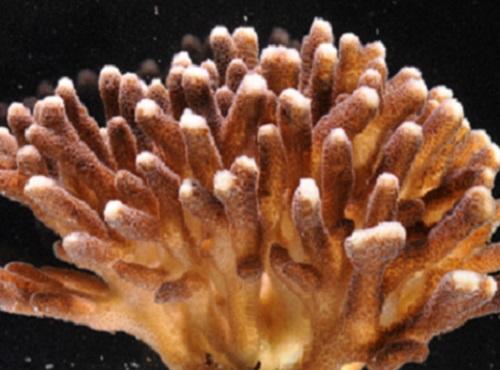Coral lifestyles reflected in their genes

KAUST researchers have sequenced the genome of the robust coral Stylophora pistillata. Comparisons with another coral species demonstrates that the two are far more genetically diverse than anticipated. Credit: © 2017 Eric Tambutté
Reef-building corals diverged into two genetically distinct groups, called the robust clade and the complex clade, at least 240 million years ago. Until now, the only complex coral genome available has been for the complex coral Acropora digitifera. An international team, led by Christian Voolstra and Manuel Aranda from KAUST, sequenced the genome of the robust coral Stylophora pistillata and then compared it with the existing Acropora genome.
“Before we began sequencing, we had to develop a method to obtain Stylophora DNA that was not contaminated by DNA from the coral's symbiotic algae,” says Aranda. “We removed the symbionts by isolating the coral nuclei before extracting the DNA.”
Corals exhibit high levels of genetic variation within the same species. This makes it even more difficult to stitch the genome together from the fragmented pieces of DNA.
“Once you have sequenced your genome, you must pick out and label each individual gene,” says Voolstra. “It's like trying to read a book with no spaces between the words!”
Once they had the complete genome, the researchers searched for proteins and genes conserved across the two corals. Genes that matched one-to-one across both species tended to be those that control the basic necessities for staying alive. Where the corals differed, however, was in areas like immunity and specific symbiotic relationships.
“If one coral has one copy of a gene while the other has many, it implies that selective, evolutionary forces have come into play, such as building immunity to a specific pathogen,” says Aranda. “On the other hand, where the corals have selected to live with different symbiotic algae and bacteria, completely different genes and proteins are expanded by each coral.”
Their results indicate that Stylophora and Acropora are surprisingly genetically disparate. It remains to be seen whether all corals in one clade follow similar genetic patterns or simply that the team happened to pick out two species that are wildly different. Further clarification will be sought through a larger-scale project called Reef Future Genomics (ReFuGe 2020), which will sequence an additional eight coral genomes by 2020.
“Rather beautifully, with the completion of the Stylophora pistillata genome, we now have the genome for an entire coral holobiont–the coral, the symbiont and its associated bacteria,” says Voolstra.
Media Contact
All latest news from the category: Life Sciences and Chemistry
Articles and reports from the Life Sciences and chemistry area deal with applied and basic research into modern biology, chemistry and human medicine.
Valuable information can be found on a range of life sciences fields including bacteriology, biochemistry, bionics, bioinformatics, biophysics, biotechnology, genetics, geobotany, human biology, marine biology, microbiology, molecular biology, cellular biology, zoology, bioinorganic chemistry, microchemistry and environmental chemistry.
Newest articles

Webb captures top of iconic horsehead nebula in unprecedented detail
NASA’s James Webb Space Telescope has captured the sharpest infrared images to date of a zoomed-in portion of one of the most distinctive objects in our skies, the Horsehead Nebula….

Cost-effective, high-capacity, and cyclable lithium-ion battery cathodes
Charge-recharge cycling of lithium-superrich iron oxide, a cost-effective and high-capacity cathode for new-generation lithium-ion batteries, can be greatly improved by doping with readily available mineral elements. The energy capacity and…

Novel genetic plant regeneration approach
…without the application of phytohormones. Researchers develop a novel plant regeneration approach by modulating the expression of genes that control plant cell differentiation. For ages now, plants have been the…





















